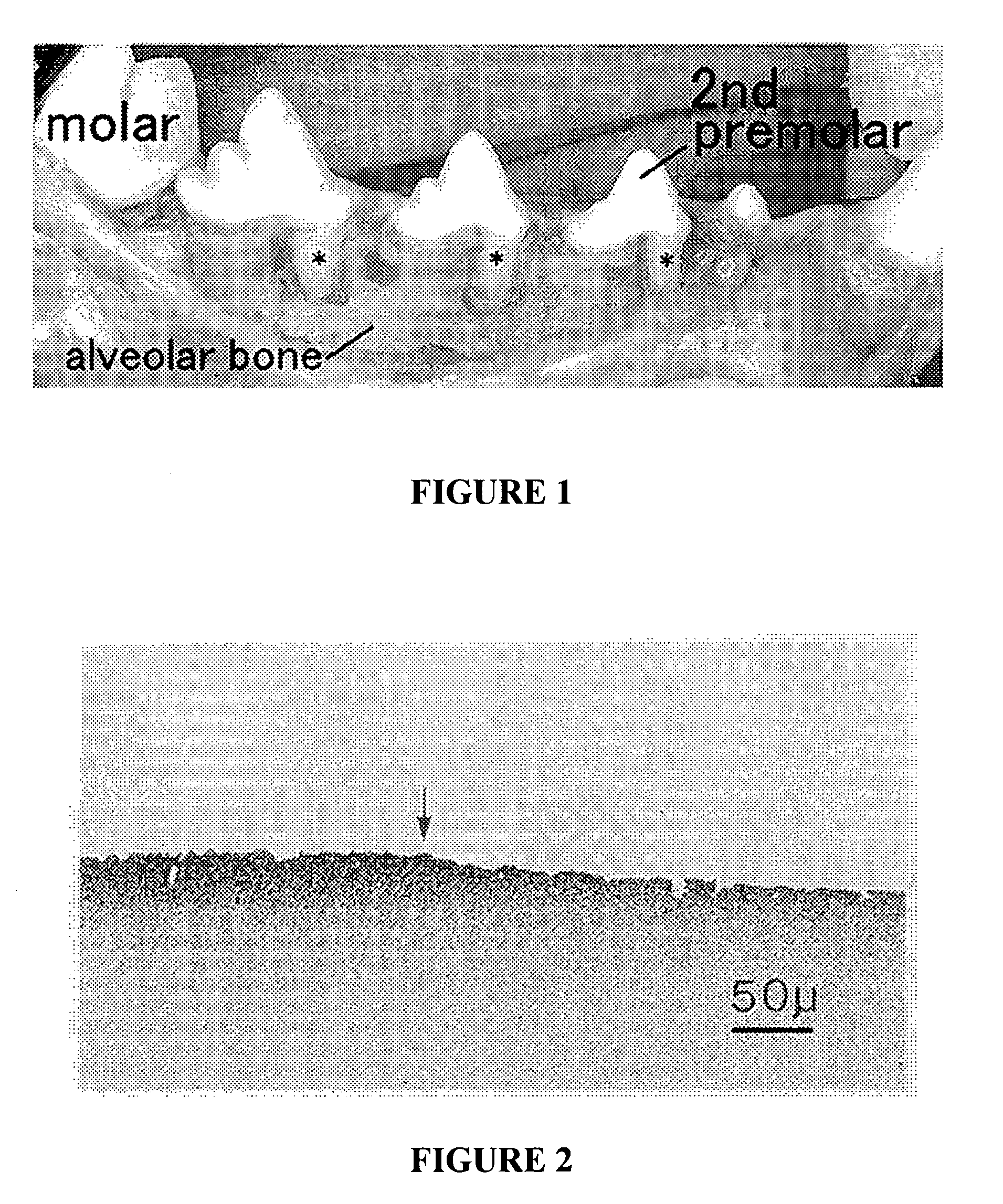Effect of porcine sheath proteins on the regeneration activity of periodontal ligament
a technology of regeneration activity and porcine sheath protein, which is applied in the field of periodontal tissue regeneration, can solve the problems of not always achieving the periodontal regeneration which gratifies patients' desires, risk of infection of e type or unknown virus, and not always denying the same patien
- Summary
- Abstract
- Description
- Claims
- Application Information
AI Technical Summary
Benefits of technology
Problems solved by technology
Method used
Image
Examples
example 1
Material & Methods
[0183]All experimental procedures involving the use of animals had been reviewed and approved by the Institutional Animal Care Program of Tsurumi University.
Detection of CR Promoting Activity
[0184]CR promoting activity of enamel proteins obtained at each extracted and purified step were examined by eight-week histological analysis of buccal dehiscence type bone defects created along the roots of canine mandible (FIG. 1).
Extraction of Enamel Proteins
[0185]From porcine secretory enamel, the outer layer sample (newly formed enamel) and inner layer sample were prepared. From these samples, neutral soluble and alkaline soluble fractions were extracted sequentially by homogenizing in the buffer for short term. CR promoting activity was found in alkaline soluble fraction of outer layer secretory enamel. And then the CR promoting protein was separated by Sephadex G-100 gel filtration, DEAE ion exchange chromatography and finery partially purified by a gel filtration recycl...
example 2
Material & Methods
[0199]For the usage of human cells, informed consent was obtained from all patients under a protocol (No. 103) approved by the Ethics Committee at Tsurumi University.
Purification of Sheath Proteins
[0200]Since CR promoting activity was determined in sheath proteins which resided in newly formed secretory enamel, they were purified to be homogeneous. The aggregate of sheath proteins was separated by Sephadex G-100 Superfine gel filtration from the alkaline-soluble fraction of the outer enamel layer sample. It was further separated by HPLC using double tandem TSKgel G-3000PW columns (TOSOH, Tokyo, Japan; 7.5 mm I.D.×60 cm) in the carbonate buffer (pH 10.8). The sheath proteins in the aggregate of the first eluted peak were purified to homogeneity by recycle over the double tandem TSKgel G-3000PW columns equilibrated with 4 M guanidine solution (pH 7.4) buffer.
[0201]Six peptides were synthesized based on the amino acid sequences of N- and C-terminal side of 17 kDa shea...
example 3
Material & Methods
[0209]The peptides were synthesized based on the sequence of C-terminal side peptide of human sheath protein contains 66 amino acid residues different from the 40 residues of porcine extra C-terminal peptide.
[0210]Their sequences are SEQ ID NO: 3 (H-1), SEQ ID NO: 1 (H-2), SEQ ID NO: 2 (H-3), SEQ ID NO: 4 (H-4) and SEQ ID NO: 5 (H-5). For searching the shortest peptide had cytodifferetiation activity of HPDL cells, SEQ ID NO: 26 (H-2-1), SEQ ID NO: 27 (H-3-1), SEQ ID NO: 28 (H-2-2), SEQ ID NO: 29 (H-3-2), SEQ ID NO: 30 (H-2-3), SEQ ID NO: 31 (H-3-3) and SEQ ID NO: 32 (H-2-4) were synthesized.
[0211]The bioactivities of these synthetic peptides were tested their cytodifferentiation activity of HPDL cells and ST2 cells by determination of increasing ALP inducing activity on cell culture system. When these peptides applied in cell culture system, the concentration of their peptides was employed around 1 ng / ml. In the case of TGF-□1, the concentration was 10 ng / ml.
Miner...
PUM
| Property | Measurement | Unit |
|---|---|---|
| molecular weights | aaaaa | aaaaa |
| molecular mass | aaaaa | aaaaa |
| molecular mass | aaaaa | aaaaa |
Abstract
Description
Claims
Application Information
 Login to View More
Login to View More - R&D
- Intellectual Property
- Life Sciences
- Materials
- Tech Scout
- Unparalleled Data Quality
- Higher Quality Content
- 60% Fewer Hallucinations
Browse by: Latest US Patents, China's latest patents, Technical Efficacy Thesaurus, Application Domain, Technology Topic, Popular Technical Reports.
© 2025 PatSnap. All rights reserved.Legal|Privacy policy|Modern Slavery Act Transparency Statement|Sitemap|About US| Contact US: help@patsnap.com



